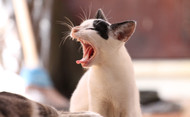Oral Health for Cats | Alaska Mill & Feed
Posted by Kimberly McCourtney on Dec 3rd 2020
According to the American Veterinary Dental Society (AVDS), 70% of cats show signs of oral disease by age three, often indicated by bad breath, a change in eating habits, pawing at the face and mouth and depression. Besides causing receding gums and tooth loss, bacteria in the mouth can enter the bloodstream and over time, damage the heart, liver and kidneys. Regular professional care from a veterinarian and daily home care are the best ways to attain healthy mouths in cats.
HEALTHY MOUTHS START AT HOME: 5 Ways to Promote Oral Health
1. Brush 2-3 times a week. Brushing a cat’s teeth is the most effective method of keeping teeth and gums healthy. Brushing teeth will help control plaque buildup, which needs to be removed from a cat’s teeth before it mineralizes into tartar. It’s best to introduce a dental hygiene regimen slowly, ensuring a comfortable and happy experience for all.
2. Provide Chews, Treats and Toys.
Although cats do not fully chew their food, some may also respond to raw bones
or cat specific chew treats. Safe chews and toys can keep plaque from building
up on the teeth and prevent bad breath. Many
treats are available that aid in dental health. Some include ingredients to
promote digestion and fight plaque, but things as simple as treat size and
shape can help promote healthy teeth and gums.
3.
Introduce Supplements for Oral Health. Intended to promote
proper digestion and fight plaque and tartar, there are a number of supplements
that help to keep teeth clean. Made with ingredients such as seaweed and cheese
enzymes, dental supplements are available in a handful of forms including
powders and liquids.
4.
Feed Foods that Promote a Healthy Mouth Environment.
Dental
Formulas. A few dry cat foods are formulated specifically to support dental
health. The larger kibble size encourages chewing, which may create a gentle
scrubbing action on the teeth. Most dental formulas also include ingredients
that promote a healthy mouth environment.
Raw
Foods. Raw foods often improve the mouth and dental health by
delivering nutrition in its most natural, digestible forms. Raw chicken necks
work great as nutritious dental chews for many cats.
Hairball Formulas. Eliminating chronic hairball problems can greatly improve a cat’s oral health, since stomach acids present in vomit can erode tooth enamel.
5. Schedule routine check-ups with a veterinarian. Regular professional care and dental check-ups from veterinarians are essential to maintaining the health and happiness of cats.

